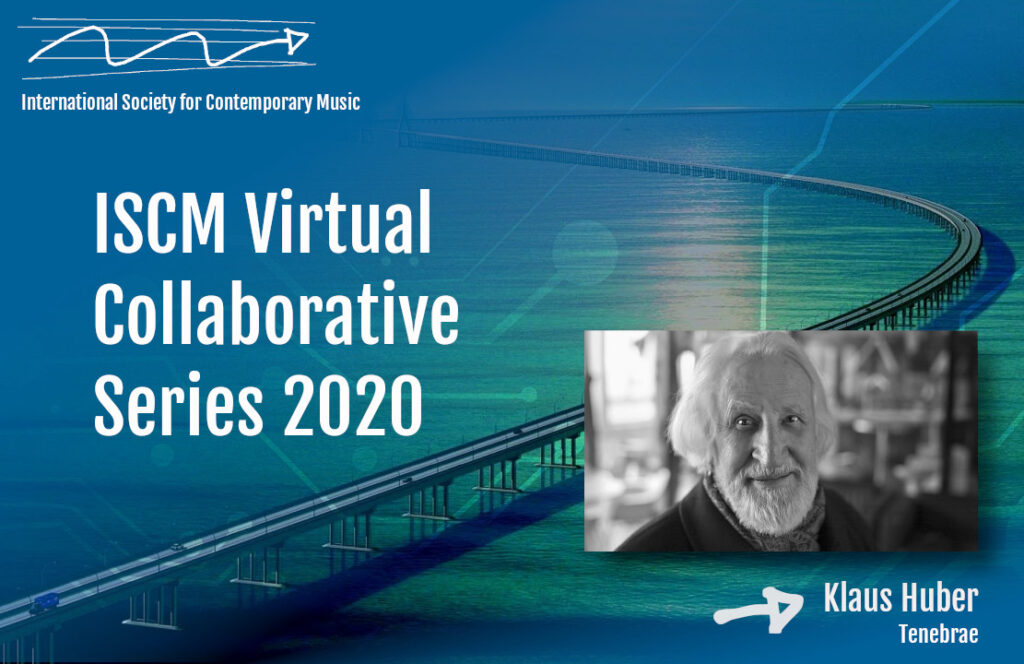Klaus Huber: Tenebrae

ISCM Honorary Member Klaus Huber (30 November 1924 – 2 October 2017) first studied violin and music pedagogy from 1947 to 1949 at the Zurich Conservatory with Stefi Geyer. From 1949 to 1955, he was a violin teacher at the Zurich Conservatory. At the same time he studied composition with Willy Burkhard. He continued his composition studies with Boris Blacher in Berlin.
As a composer, Huber began with serial music influenced by Anton Webern. His international breakthrough came in 1959 with the world premiere of his chamber cantata Des Engels Anredung an die Seele at the Weltmusiktage (World Music Days) of the Internationale Gesellschaft für Neue Musik in Rome. Unusually for the time, he used consonant intervals within a strictly serial context. He received the Ernst von Siemens Music Prize in 2009, among other awards. He became one of the leading figures of his generation in Europe, compared to Pierre Boulez and Karlheinz Stockhausen. He composed extensively for chamber ensembles, choirs, soloists and orchestra. His works for the theatre look for scenes beyond opera and oratorio. Huber was a socially and politically conscious composer and his music often conveys a humanistic message. He set texts by biblical prophets and medieval mystics such as Hildegard of Bingen. He was also inspired by texts of Augustine, Andreas Gryphius, Ernst Bloch, Heinrich Böll, and of Latin American liberation theologians. From the 1980s, Huber studied Arabic music and poetry and included their influences in his works.
Klaus Huber taught music history at the Lucerne Conservatory from 1960 to 1963, and composition at the City of Basel Music Academy (1961–72) and at the Hochschule für Musik Freiburg (1973–90). He was also appointed director of the composition seminars at the Gaudeamus Foundation in Bilthoven, Netherlands, in 1966, 1968, and 1972. Additionally, he held international visiting professorships and composition classes in (among others) Paris, London, Geneva, Milan, Lyon, Montreal, Sarajevo, and Tatui (Brazil).Several of his students became internationally recognized composers, including Brian Ferneyhough, Younghi Pagh-Paan (later his wife), Toshio Hosokawa, Wolfgang Rihm, and Kaija Saariaho. He was a member of the Akademie der Künste in Berlin from 1986.His manuscripts are kept by the Paul Sacher Foundation in Basel.
Tenebrae for large orchestra was composed between spring 1966 and winter 1967 and is dedicated to Paul Sacher, who commissioned this work. It was premiered at the World Music Festival of the IGNM as part of the Warsaw Autumn on September 24, 1968 under Mario di Bonaventura with the Katowice Radio Symphony Orchestra. The work received the Beethoven Prize of the city of Bonn in 1970.
Huber has written:
When I wrote Tenebrae, I was under tremendous inner pressure: My ideas revolved around the symbol “solar eclipse”, “eclipse of life”: not in the sense of a Stifter’s description with the means of music, but rather in that sense of invocation an ancient symbol of humanity that is able to penetrate into the innermost depths of human existence through a tremendous pressure. It is therefore possible, yes probable, that the orchestra’s instruments are under a pressure similar to that which I had to endure while working on Tenebrae. Thousands of years old Eastern ways of thinking do not make any fundamental separation between man and nature, the cosmos. Both are secure as a whole. But our western worldview has been extremely homocentric for a long time. Everything that does not appear to us to be rationally transparent, we spontaneously perceive as hostile. Also and especially in music.
There is an incomparable vision in Jean Paul: “The dream of space”. A messenger leads the poet through all unlimited spaces of the cosmos. Man experiences this spiritual journey – which, incidentally, anticipates later discoveries of astronomy – with fear, horror, but also with hope. It was precisely this vision that influenced the composition of my Tenebrae.
